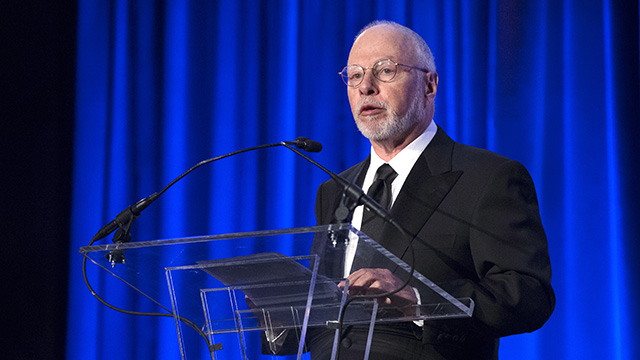This post first appeared at The Nation.

Paul Singer, founder and CEO of hedge fund Elliott Management Corporation, speaks at the Manhattan Institute for Policy Research Alexander Hamilton Award Dinner, Monday, May 12, 2014, in New York. (Photo by John Minchillo/AP)
This is the year of the mega-donor: just 42 people are responsible for nearly a third of super PAC spending in the 2014 election cycle. Super PACs, meanwhile, are outspending the national parties. The list of would-be kingmakers includes Tom Steyer, the former hedge-fund manager who’s poured out $73 million to elect environmentally friendly Democrats; Michael Bloomberg, who’s distributed upwards of $20 million on behalf of both sides; and Paul Singer, the “vulture-fund billionaire” and powerful Republican fundraiser.
Take a look at the list of top donors. They might have distinctly different political agendas, but they have one thing irrefutably in common: they’re almost exclusively old white guys. Only seven women made it into the 42, and not a single person of color.
One of the things highlighted in the aftermath of Michael Brown’s death in Ferguson, Missouri, is how poorly America’s political leadership, from city councils to the US Senate, reflects the diversity of the country. According to data compiled by the Reflective Democracy Campaign, white men make up 65 percent of elected officials — more than twice their proportion in the general population. Only 4 percent of our political leaders are women of color. As Jelani Cobb writes in The New Yorker, the midterm elections won’t right this imbalance between demographics and political representation, no matter which party wins the Senate.
In fact, the midterms suggest that white men are gaining clout, at least behind the veil. As campaign finance laws erode, political power is increasingly concentrated among the billionaires playing the strings of the electoral marionette — a pool that looks less diverse even than Congress. (Given the prominence of dark-money groups, it’s likely that some of the biggest individual players in the midterms are anonymous. But there’s no indication that secret donors are any more diverse than others.)
It’s shrinking, too. Between 1990 and 2010, the number of individual donors increased each election cycle. This year, the pool contracted from 817,464 individual contributors in 2010 to 666,773 as of late October, according to a new analysis from CRP. “Despite only a slight increase in the cost of the election, outside groups, which are overwhelmingly fueled by large donors, are picking up more of the tab, candidates are cutting back on their spending, and there are fewer large (over $200) individual donors contributing overall to candidates and parties,” reads the report.
Politicians should be accountable to the electorate, which is growing more diverse. But the fact that candidates are growing more dependent on a narrow group of contributors means that they may be responsive to a limited set of concerns. There are many factors blunting the political impact of demographic changes, but certainly laws that amplify a less diverse group of people’s voices over others’ in an election is one of them.
The unfettering of big money also makes it harder to elect minority candidates. “Why is it that the Congress we have right now doesn’t look anything like the rest of the country? A lot of it has to do with our campaign finance laws and the fact that there’s so much money in the system and you need so much money to run for office,” said Lawrence Norden, deputy director of the Democracy Program at the Brennan Center for Justice. “There’s no question that it makes it more difficult for people who aren’t connected to these very wealthy donors to run for office.”
Candidates raise money from people they know, Norden explained, and American social circles are deeply segregated. Three-quarters of white Americans, for example, don’t have any non-white friends. Neighborhoods remain segregated by race and class. “If you don’t have a lot of money to begin with, you’re not interacting with the people who can provide that money,” said Norden.
A number of structural changes have been proposed to right lopsided representation, many of them focused on increasing turnout among minority voters. Those suggestions are particularly salient in response to the GOP’s campaign to pass laws that make it more difficult for low-income people and people of color to vote. But turnout won’t affect the diversity of elected officials if the pool of candidates isn’t diverse to begin with. As long as the financial bar for running a viable campaign keeps rising, it’s going to be more difficult for people of color, women and low-income people to appeal for votes at all.
There’s some evidence that public campaign financing increases proportional representation. Connecticut implemented a voluntary public-financing system in 2008, which provides a fixed amount of funding to candidates who rely on small donors. A study by Demos found that the program led to a more diverse state legislature and increased Latino and female representation. Another study found that the percentage of women elected in five states with public financing was significantly higher than the national average. Unfortunately, in several states recently politicians have set to dismantling, not strengthening, public financing.
“It’s really clear that that’s a major barrier to women and people of color, in particular, that can happen on all levels, even the local level,” said Brenda Carter, director of the Reflective Democracy Campaign, about the growing power of outside money. Still, she noted that there’s been little research into the specific ways in which the influence of money in politics has a disproportionate effect on minority candidates. “Adding a race and gender lens to the money-in-politics conversation is a really important thing,” she said.


